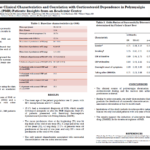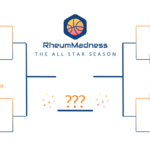Figueroa-Parra et al. set out to evaluate the effect of glucocorticoid regimens on renal response, infections and mortality rates among patients with lupus nephritis (LN). The researchers analyzed the control arms of randomized clinical trials and found a higher exposure to glucocorticoids during the initial treatment of LN was associated with better renal outcomes, at the cost of increased infections and mortality.

3 AC&R Study Summaries: Prescribing Patterns, PMR & Glucocorticoids, & Infection Screening
A Shift in Prescribing Patterns Safety issues prompt discontinuation of tofacitinib By Stephanie Song, MD, & Joshua F. Baker, MD, MSCE Why was this study done? The ORAL Surveillance study highlighted risks of cardiac events, thromboembolism (VTE) and malignancy associated with use of Janus kinase inhibitors (JAKi). We sought to determine the impact of safety…

Polymyalgia Rheumatica: New Tricks for an Old Disease
Originally posted Feb. 13, 2023; reposted in conjunction with publication of the PMR supplement to the February 2024 issue of The Rheumatologist. PHILADELPHIA—Polymyalgia rheumatica (PMR) is a chronic inflammatory condition that almost exclusively affects individuals older than 50.1 First described in 1888, PMR has been a recognized rheumatic disease since at least 1957. Diagnosing the…

Study: Most Patients with PMR Aren’t Getting Steroid-Sparing Agents in First 2 Years
A minority of patients with polymyalgia rheumatica (PMR) who were new to rheumatology practice were prescribed steroid-sparing agents through two years of follow-up. This is according to a large, U.S.-based cohort study, published in Arthritis Care & Research, which also found that nearly two-thirds of the patients remained on glucocorticoids beyond one year.1 “Our study…

Study Probes Corticosteroid Dependence in Polymyalgia Rheumatica
Background/Purpose Polymyalgia rheumatica (PMR) treatment is primarily based on long-term corticosteroids, which results in significant toxicities. Studies have shown that patients with PMR are exposed to years of corticosteroid treatment.1,2 In a single academic center cohort, we found that 76% of patients remained on steroids at the end of two years.3 In a second cohort…

Updates in Vasculitis Criteria, Guidelines & Medications
BALTIMORE—2022 was an exciting year in the field of vasculitis, not least of all because the ACR and EULAR released classification criteria for several forms. This development came just one year after the release of ACR/Vasculitis Foundation (VF) guidelines on the management of a number of vasculitides. With so much new information to be absorbed,…

Glucocorticoids in RA
The historical & continuing roles of glucocorticoids in the treatment of RA are discussed.
Glucocorticoid Use at Any Dose Increases Fracture Risk
The accepted wisdom is that the negative effects of glucocorticoids on bone depend on the dose and treatment duration. Adami et al. conducted this study to determine, in a real-life setting, the risk of fragility fracture associated with the dose of glucocorticoids in patients with inflammatory rheumatic musculoskeletal diseases.

RheumMadness 2023: The Results Are In
RheumMadness is an online tournament in which a bracket of teams, representing key learning concepts in rheumatology, compete against each other in a series of head-to-head matchups, much like basketball teams in the NCAA’s March Madness. The 2023 tournament theme was The All Star Season. Each team represented one all star article competing to be…

Glucocorticoid Use May Result in Loss of Bone Mineral Density
Adami et al. examined the fracture risk associated with glucocorticoid treatment in women with inflammatory rheumatic musculoskeletal diseases, finding that low-dose glucocorticoid use may result in significant bone mineral density loss in patients who are not on anti-osteoporotic drugs.
- « Previous Page
- 1
- 2
- 3
- 4
- …
- 6
- Next Page »